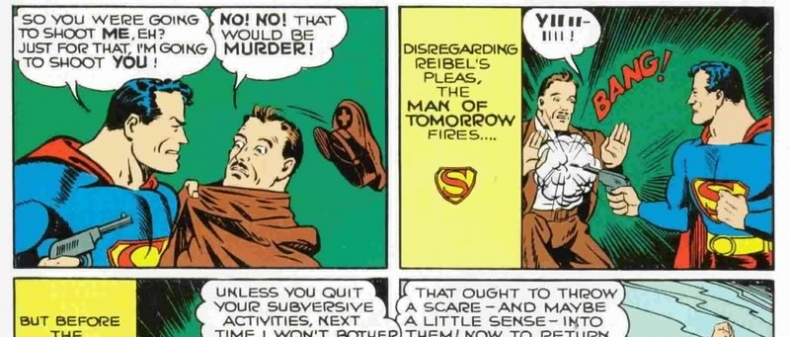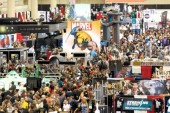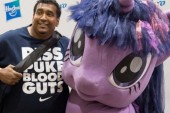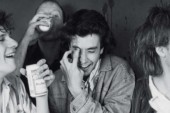
Superman, the spandex-clad symbol of justice and fair-mindedness in a malevolent universe, celebrates his 75th birthday this year. For the second time, Canada Post is immortalizing Superman in stamp form, as a celebration of ‘the ultimate hyphenated citizen —a Canadian-American-Kryptonian superhero.”
The character continues to command a space in the popular imagination – firmly planted in the top tier of American superheroes. It’s often forgotten that much of Superman’s locales and attitude were forged in Canada — the visual brainchild of a poor, 9-year old kid in Toronto. Joe Shuster would sit in rapt attention on his father’s lap and look at comic strips in the Toronto Star. He later would draw on anything he could find, using scraps from heaps of rubbish. When DC comics approved his first two stories, he had to get a loan to purchase proper paper to draw them on.
Joe Shuster’s early experiences as a newspaper carrier for the Toronto Star would become the basis for reporter Clark Kent’s newsroom workplace — christened the “Daily Star”. Toronto itself was the initial model for Metropolis, the booming, sky-scraper filled vista where Clark Kent resided. Superman has been the source of critical analysis, the butt of jokes, even fodder for popular music. Despite naysayers, changing times and even death — Superman has been resurrected as arguably the most widely known comic icon of all time, an icon with strong roots in Canada.
Like Shuster, for many Canadian comic artists, getting started was a struggle. Dale Eaglesham grew up in Chateauguay, Quebec. “I was a very shy kid growing up, very quiet, and never really stood out in a crowd. I had a difficult youth but the one thing that helped me tremendously was my immense imagination. When I was nine years old, a friend in school suggested we do a comic for a class project. The teacher, a Mr. Shatner (no lie), said ‘okay’, bless him, and I found my holy grail that day. Not only could I daydream, I could record it on paper.”
Joe Shuster Award-winning artist David Finch also found his escape — and his livelihood — in comics. Growing up in Windsor, Finch liked to draw when he was quite young. “I knew that I could draw well but I didn’t see it as something you could do for an actual career. It just didn’t seem like a possibility. And I really wasn’t exposed to comics a lot as a kid. My sister was a big fan. I started reading through hers when I was older — I was 18 years old, really, when I got into it. The minute I found it, I loved it. I knew it was a way for me to create my own little world with my art. I think I’m a bit of an introvert so it just really clicked for me. I could sit down, all me, and I could just make my own little world – and stories. I’m a high school drop-out, so I knew I needed something. I think I had the advantage of, really, the limited options.” He drew incessantly, venturing to New York two years later with samples. “My first job was actually for a comic artist, Marc Silvestri, who taught me everything he knew. So I got very lucky, getting kind of an ‘in’ with somebody who really knew what he was doing.”
Finch respected the Superman character that seemed omnipresent in popular culture during his early childhood. When he was selected to draw him, he was acutely aware of the significance. “There’s a lot of pressure for me, because there are so many great artists over so many years who have drawn Superman. I really want to be able to reflect that as much as I can, in the look that he’s so famous for – but also not lose myself in it. I draw in a very dark style, I use a lot of shadow. It’s just the way that I draw, and I find it can be difficult for me to draw a book that’s very optimistic —which Superman tends to be. I like the fact that Superman is just such an iconic, instantly recognizable, larger than life character. On any page that I draw superman, he’s always the center of interest and the focal point and he’s just such a great anchor for any team, and he’s just — he’s got so much visual presence.”
Canadian comic artist Stuart Immonen has also been tasked with drawing him, and in 2010 won the Joe Shuster Award for Outstanding Artist. “Any character with a history spanning over three-quarters of a century deserves to be handled with respect. When I started on the Superman titles I was still extremely green, but eventually felt buoyed and not totally eclipsed by the rest of the creative talent on board; I simply tried to do the best work of which I was capable at the time. It was a privilege to have been asked to participate in that continuum and to have broadened the history to some small extent.” He maintains that the characteristics of Superman cannot be claimed by anyon one country, Canadian roots or no. “I really don’t think of Superman as a political instrument at all. When I was working on the titles, the mandate was pretty global; stories were not exclusively set in Metropolis or even in the U.S. I can’t believe borders would mean something to a character with such a strong moral centre, who sees all humanity as his adopted family.”
Superman resounded with him in one sense, however. “Superman is the Ur-hero, the apex toward which all other superheroes aspire. That being said, there are good stories and bad stories, especially when a character has such a long history. For me, the draw has more to do with particular writers and artists and the storylines they created than any particular aspect about Superman himself, save one. I grew up on a farm and moved to an urban environment as a young adult; I think it was perhaps this experience alone which gave me a toehold on understanding what Superman could be about.”
Eaglesham has gone on to draw hundreds popular superheroes, but Superman commands a particular reverence: “Superman is THE iconic superhero. When you work on Superman, you aren’t just drawing a superhero book, you are contributing to the body of work of a historical character. More than any other character, you need to respect the history and tradition of Superman, to understand where he comes from and why he came into being. This is the only way to understand that he doesn’t have the flair of one specific, crowd pleasing power to amaze us with, he has them all. He is a hero first and the super part comes second.”
To Eaglesham, Superman’s Canadian roots have always been apparent: “Superman was never a Canadian icon but that could be changing. We in the comic book community have been well aware of Superman’s Canadian connection, but non-comic fans had little to no idea there was one. Today, the knowledge that Shuster was Canadian is likely more widely known but still not enough for my liking. As a country, we should be shouting it to the rooftops. I’d love to be able to say Superman is Canada’s superhero, but his publishing history and association is in the US and will likely stay there.”
Despite the Superman franchise being fully enmeshed in the US comic market, he doesn’t epitomize everything American: “Superman’s very demeanour is something that is usually associated with Canadians: our politeness. Whether he is reporter Clark Kent or Superman,” says Eaglesham, “he is a good guy with a flawless moral compass. As Clark, he projects an alter ego, but not a completely opposite one to his Superman persona. While still the quintessential good guy, he is clumsy, often comically so, and decidedly non-heroic. In the superhero biz, there is no shortage of rough and tough heroes soaked in pathos. Amidst this throng, Superman is very much old school, a beacon of the golden age of comics, and he is still viable today.”
Superman continues to evolve. In the last three-quarters of a century, he has undergone countless permutations: fluctuating powers, new vulnerabilities — even death and resurrection. Finch believes that Superman’s character is becoming a little more complex — a little less certain. “I really honestly feel like Superman’s biggest revolution has been in the last few years. He’s always a character that, you know, he doesn’t have a dark side, really. He’s very optimistic, he’s a patriotic character, and he’s a bit of a boy scout. And lately, I really think they’re trying to ground their characters much more in reality. He has more real world problems than he ever did before, he’s a much more human character. He’s more of a flawed character now, a character that doesn’t really know what his purpose is and is trying to live up to. He’s a character that understands how important a Superman mythos is to the world. But he’s just a man, and somehow he’s got to live up to this larger than life reputation. Which I think makes him very interesting.”
David Finch and Stuart Immonen are Comic Featured Guests appearing at this weekend’s Fan Expo. Canada Post’s 75th Anniversary Superman Stamps will also be unveiled at Fan Expo.
____
Tiffy Thompson is a writer and illustrator for the Toronto Standard. Follow her on Twitter at @tiffyjthompson.
For more, follow us on Twitter at @TorontoStandard and subscribe to our newsletter.














